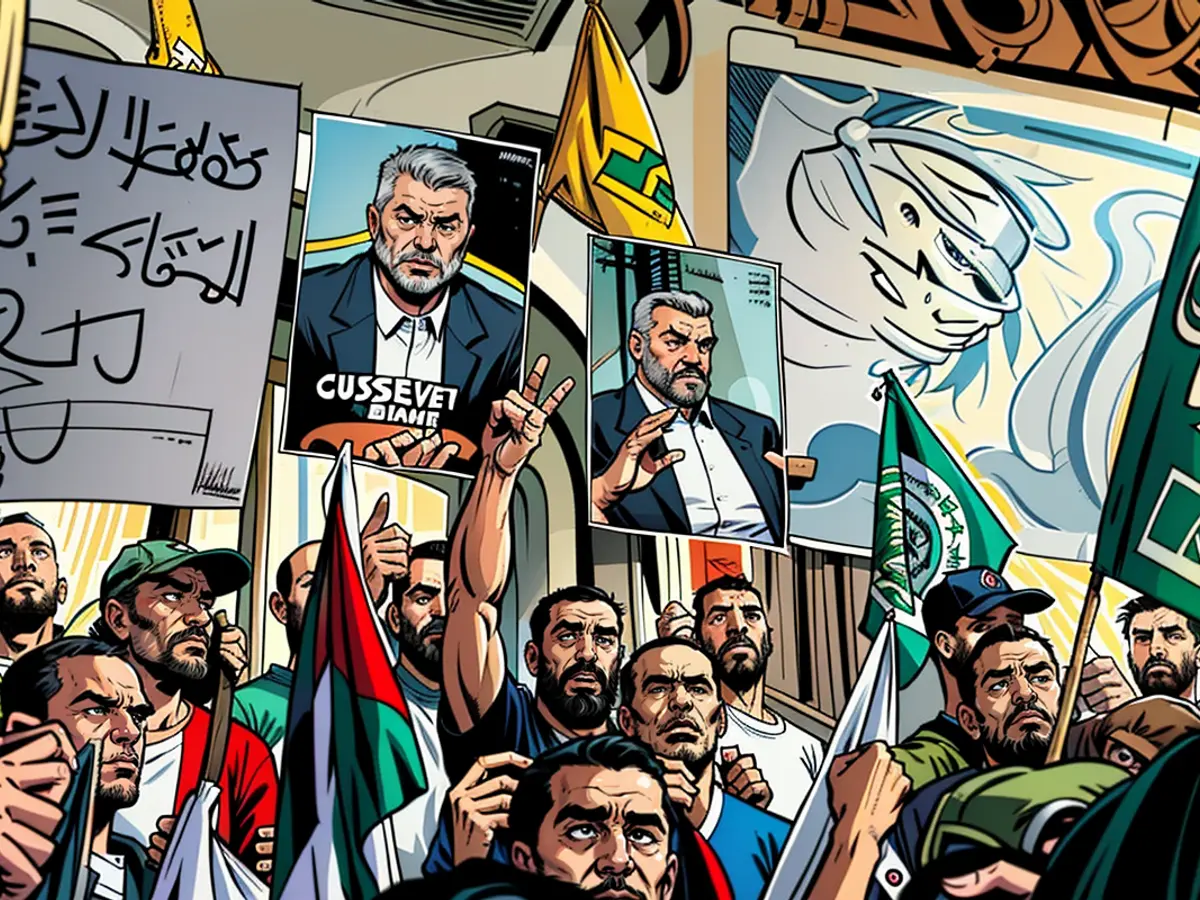Middle East Conflict - Fearing retaliation from Iran <unk> US military moves to Middle East
In the Middle East, signs are mounting for an impending retaliatory strike by Iran against Israel. Diplomatic efforts to prevent an escalation, which could lead to a regional war following the assassination of Hamas leader Ismail Haniyeh in Tehran, are reportedly being blocked by Iran.
Meanwhile, Israel's military is on high alert, while the U.S. is deploying additional warships and combat aircraft to the region for deterrence, according to the Pentagon. Both allies are preparing to defend against an attack that could occur as early as this weekend, the "Wall Street Journal" reported. It is feared that this time, the attack will be broader and more complex than Iran's April attack on Israel.
Back then, Tehran attacked the Jewish state with 330 rockets, cruise missiles, and drones. However, it did so only after signaling its intentions to diplomats and giving Israel and the U.S. time to prepare, as noted by the "Wall Street Journal". In the end, Israel was able to intercept most of the projectiles with its own forces and with the help of the U.S. and other allies. This time, Israel and its allies are "operating in a vacuum", the U.S. newspaper wrote. The lack of information and predictability is putting the entire Middle East region in one of the most dangerous moments since the start of the war in the Gaza Strip in October.
Report: Arrests in Iran following Haniyeh assassination
More than two dozen people have been arrested in connection with the fatal assassination of Hamas leader Haniyeh in Tehran, according to the "New York Times", citing two Iranians familiar with the investigation. Among those arrested are high-ranking intelligence officers, military officials, and employees of the guesthouse operated by the military, where Haniyeh was staying. According to the "Telegraph", citing two Iranian officials, Israel's foreign intelligence agency, Mossad, hired two Iranian security agents for the assassination.
They placed explosives in three rooms of the guesthouse. The agents then fled the country but maintained contact with a local source. At 2:00 AM on Wednesday, they detonated the explosives remotely in the room where Haniyeh was located. Israel has not commented on Haniyeh's death. Hamas and Iran have blamed Israel for the assassination and threatened massive retaliation.
Reports: Iran rejects all mediation efforts
The demand for a peaceful solution from "friendly and non-friendly" states is unacceptable to Tehran after the targeted killing of the political leader of the allied Hamas, Haniyeh, in Tehran, according to informed sources cited by the Iran Nuances news portal. "Israel has crossed all red lines", an Iranian diplomat was quoted as saying by the "Wall Street Journal". "Our response will be swift and hard", the diplomat said. Iran's determination to carry out a retaliatory strike will not be diminished by mediation efforts, Iran Nuances reported on the X platform. Despite this, the U.S. will continue to work with allies and partners to de-escalate the tense situation in the region, the Pentagon said.
Israel threatens Iran with a much harsher response in case of an attack than after Iran's strike in April. Back then, Israel had held back in its response to the aggression at the request of the US and other allies, said Israel's national security advisor Zachi Hanegbi in an interview with "Bild" and other Axel Springer media. "That's a different situation now. You can hold back once, not twice," he said. Amid escalating tensions, US Defense Secretary Lloyd Austin informed his Israeli counterpart Joav Galant about a realignment of US military capabilities in the region, Pentagon spokesperson Sabrina Singh announced.
US strengthens military presence

The aim is to support Israel's defense and respond to the "developing crisis" in the region, the spokesperson said. To this end, US Defense Secretary Austin ordered the deployment of additional destroyers capable of intercepting ballistic missiles, as well as another fighter squadron to the region. Furthermore, steps are being taken to increase the readiness for the deployment of additional land-based ballistic missile defense systems, a Pentagon statement said.
Meanwhile, according to human rights activists, Israel struck targets of Hezbollah in the border area of Lebanon and Syria. Israel hit a weapons depot with rockets and a headquarters of the militia, Lebanese activists and the Syrian Observatory for Human Rights reported. Israel usually does not comment on attacks in neighboring countries.
Activists: Israel attacks Hezbollah at Syria's border
Israel regularly targets sites of the militias affiliated with Iran there. A large part of Iranian weapons also reaches Hezbollah in Lebanon via Syria, which has been engaged in almost daily mutual fire with the Israeli army since the beginning of the Gaza war ten months ago. Hezbollah claims to act out of solidarity with Hamas in the Gaza Strip. In the region, concerns about a military conflict between Israel and Iran and its allies like Hezbollah are growing following the killings of Haniyah and the high-ranking Hezbollah commander Fuad Shukr in Beirut.
Such a conflict had already threatened after April 14, when the Iranian Revolutionary Guard Corps fired hundreds of drones and rockets at Israel. The background of the attack was an Israeli strike on the Iranian embassy compound in the Syrian capital Damascus, in which two Iranian generals were killed at the beginning of April. Israel had then responded with a counterattack on an airbase in central Iran, after which Tehran said it would not pursue the matter further. Israel's security advisor Hanegbi now warned Iran in the "Bild" interview against a new attack.
Israel warns Iran: An attack would be a mistake
"Attacking Israel is something they will pay a very painful price for. Hopefully, they won't do it. It would be a mistake. Israel is very strong," said Hanegbi. Similarly, Israel's Prime Minister Benjamin Netanyahu had expressed himself in recent days. He does not believe the region is on the brink of war, said Hanegbi. Iran does not want a comprehensive war. US President Joe Biden expressed "very serious concern" on Thursday. According to his own statements, he had a "very direct" phone call with Netanjahu.
The killing of Haniyeh did not assist in the negotiations for a ceasefire in the Gaza conflict, said the US President. Attacks on Haniyeh and Shukri had recently raised concerns that indirect talks for a ceasefire in Gaza might stall. Netanyahu has approved the dispatch of a delegation for further discussions in Cairo, the office of the Israeli Prime Minister announced. The delegation is set to depart for the Egyptian capital this evening or Sunday.
The conflict between Iran and Israel remains tense, with Iran threatening a retaliatory strike following the assassination of Hamas leader Ismail Haniyeh. This violent retaliation could lead to a broader and more complex conflict, as Israel and its allies prepare to defend against an attack.
Despite international efforts to mediate and de-escalate the situation, Iran has rejected all mediation efforts, stating that Israel has crossed all red lines. Iran's determination to retaliate is unwavering, and a swift and hard response is expected.









